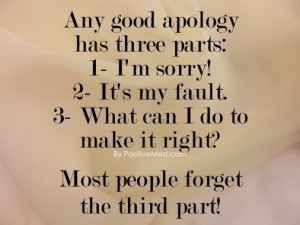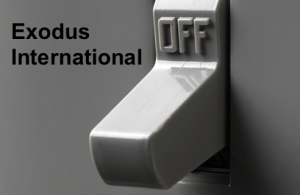Following in the footsteps of Exodus International President Alan Chambers, The organization’s Vice President, Randy Thomas has also offered an apology to the gay1 community. I don’t have much to say about the quality of the apology. (If you want to see thoughts on that, check out Zack Ford’s post on the subject.
I did find a couple of interesting bits in the apology though. For example, when Randy acknowledged that he wasn’t originally aware of some of Exodus’s policies, he said the following (bold emphasis mine):
My understanding of public policy at that time was limited to the talking points I was given to tailor my testimony around.
I find this admission that such talking points existed and that testimonies given by ex-gays were apparently expected to fit those talking points rather interesting. While I was critiquing the Yuans’ book, Out of a Far Country, I noted the following about how Christopher’s own testimony followed a certain narrative and how some love to promote that narrative as universal:
Unfortunately, that’s not the reality I occupy. In reality, I live in a world where some people — influential people — have invested a great deal of time and money in presenting QUILTBAG people — particularly gay men — in the worst light possible. There are those who still either explicitly or implicitly seek to link homosexuality with substance abuse, pedophilia, risky sex, and other destructive behaviors.
Such people like men like Christopher Yuan. They love such men’s stories, because they can point those men’s experiences, generalize them, and say, “See? This is what all gay men (and QUILTBAG people in general) are like!” Courageous men like Christopher — and I do not discount his courage or the truly amazing nature of his transformative journey — become tools in the anti-gay political machine’s to inaccurately paint and even dehumanize an entire class of people.
It strikes me that organizations like Exodus might have been actually pushing that narrative by encouraging its members to tailor their testimonies around talking points. Perhaps such organizations went to a great deal to not only push such narratives about LGBT people, but helped construct them in the first place.
The other thing that I noticed was Randy’s reason for keeping quiet about some of the problems when he encountered them in Exodus and various member ministries (again, bold emphasis mine):
There are many good people in the broader Exodus movement that I didn’t want to hurt by sharing the bad we’d uncovered. Other staff members and I dealt with some of these ills privately…To protect some leaders, which wasn’t totally inappropriate, others didn’t know how bad some things had gotten. Therefore, some have been shocked that Alan apologized and that I, among others, were supportive. In order to protect the reputation of some, I chose silence.
In order to protect the reputation of some — and I speculate the organization as a whole, Randy Thomas chose to remain quiet about the harms he knew about. I doubt Randy was the only one involved in Exodus who did this, either. The thing is, this is a pattern among religious organizations and institutions. In order to “protect reputations,” things are “handled privately” and then swept under the rug where they are out of view and those involved cannot be held more fully accountable.
Religious leaders need to learn that it doesn’t matter what you’re talking about, this shit isn’t right.
Some might wonder why this matters. After all, Exodus is closing its doors, so this should all be over, right? Well, no. Setting aside that Exodus 2.0 (by some other name) is still an unknown up-and-coming thing. Exodus Member Ministries are still in operation. Other organizations like Restored Hope Network and J.O.N.A.H. are still around and pushing the ex-gay myth. N.A.R.T.H. and its affiliates are still around pushing pseudo-scientifically based conversion therapies. And the anti-gay political organizations and individuals who still argue that LGBT people don’t need equal protection under the law because they can “change” are still in operation.
Randy’s admissions should be taken as things to look for in all these other organizations? How many of them are still covering up harm to “protect reputations”? How many of them are still carefully orchestrating ex-gay testimonies carefully selected and tailored to promote narratives about LGBT people as if they’re universal?
These are the things that those who used to be involved now admit to. We need to be vigilant to see who is still involved and are still engaging in such things.
1That’s the word he used. I’m not intentionally ignoring the damage that ex-gay ministries have caused bisexual or trans* people.



